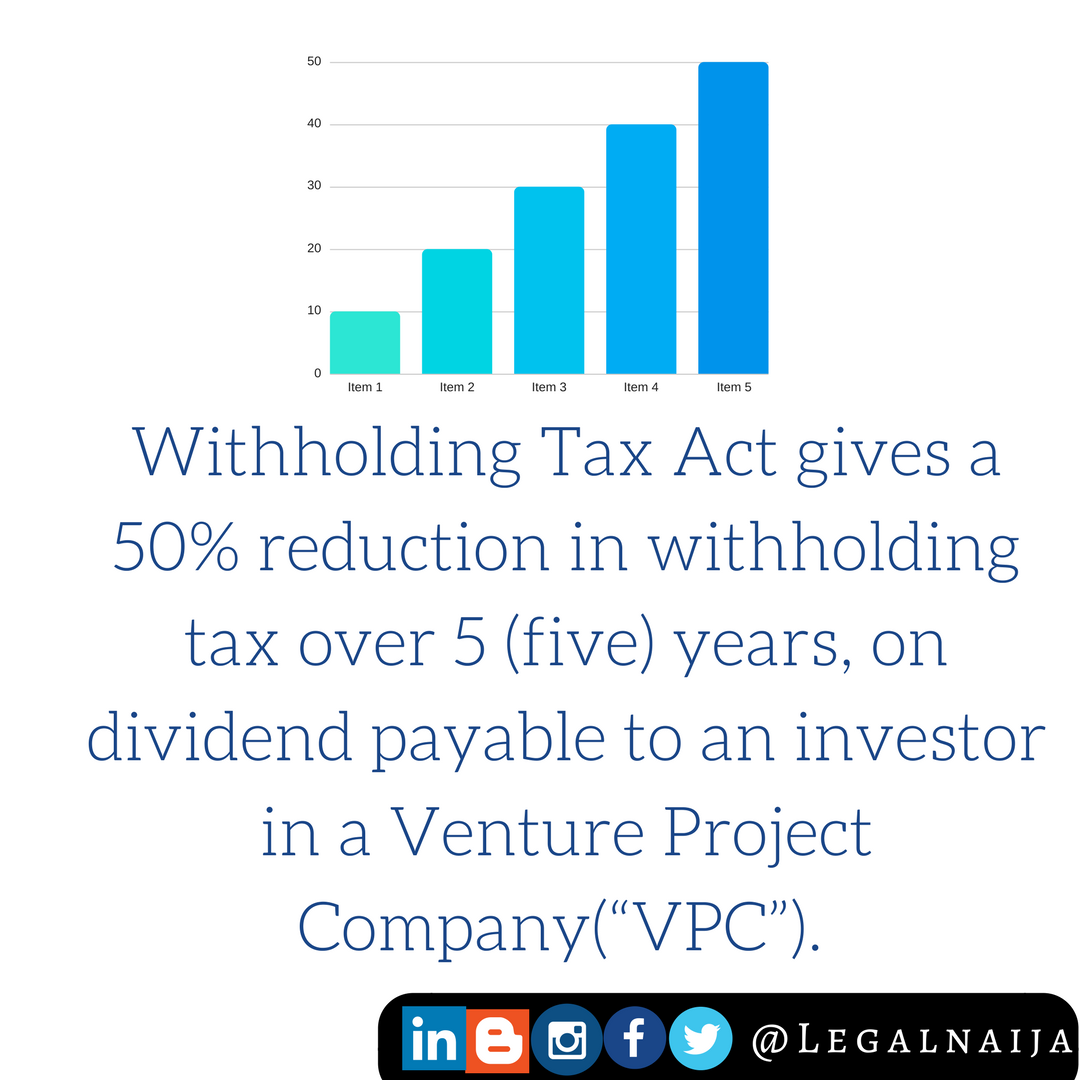
Developing countries tend
to use both targeted and general incentives to attract investors. Such
incentives may be included in tax laws, financial regulations, investment laws,
government directives and the likes. The mere fact that tax incentives do not
require upfront use of government funds makes them a preferable option for
developing countries, unlike developed countries that are generally more open
to grants or subsidized loans.
to use both targeted and general incentives to attract investors. Such
incentives may be included in tax laws, financial regulations, investment laws,
government directives and the likes. The mere fact that tax incentives do not
require upfront use of government funds makes them a preferable option for
developing countries, unlike developed countries that are generally more open
to grants or subsidized loans.
In line with the above,
Nigeria passed the Venture Capital (Incentives) Act Cap V2, LFN 2004 (“The
Act”) which was enacted for the sole purpose of granting additional
tax incentives to venture capital and start-ups generally. However, the
structure/mode of operation of a start-up is a major determinant of which and
what benefits are applicable to such entities (kindly seek professional
advice for clarity).
Nigeria passed the Venture Capital (Incentives) Act Cap V2, LFN 2004 (“The
Act”) which was enacted for the sole purpose of granting additional
tax incentives to venture capital and start-ups generally. However, the
structure/mode of operation of a start-up is a major determinant of which and
what benefits are applicable to such entities (kindly seek professional
advice for clarity).
The incentives in the Act
are as follows;
are as follows;
1. Pioneer
Status: This exempts an organization from paying company
income tax for a period of 3 years. The privilege can be extended for an
additional 2 years, making a possible total of 5 (five) years of tax exemption.
Status: This exempts an organization from paying company
income tax for a period of 3 years. The privilege can be extended for an
additional 2 years, making a possible total of 5 (five) years of tax exemption.
2. Withholding
Tax: The
Act gives a 50% reduction in withholding tax over a period of 5 (five) years,
on dividend payable to an investor in a Venture Project Company(“VPC”).
Tax: The
Act gives a 50% reduction in withholding tax over a period of 5 (five) years,
on dividend payable to an investor in a Venture Project Company(“VPC”).
3. Capital
Gains Incentives: This is a reduction in the amount payable
as tax on the profit made when disposing an asset that has increased in value.
Gains Incentives: This is a reduction in the amount payable
as tax on the profit made when disposing an asset that has increased in value.
The act provide as follows:
- Disposal of capital within five years
of investment, 100 per cent - Disposal of capital between six and
ten of investment, 75 per cent - Disposal of capital between eleven and
fifteen years of investment, 25%
4. Capital
Allowance: It is a tax deduction companies or
start-ups can claim for the wear and tear of fixed assets used in trade or business.
They are as follows:
Allowance: It is a tax deduction companies or
start-ups can claim for the wear and tear of fixed assets used in trade or business.
They are as follows:
- 30% deduction for the 1st year
- 30% deduction for the 2nd year
- 20% deduction for the 3rd year
- 10% deduction for the fourth year
- 10% deduction for the 5th year
5. Export
Incentives: Start-ups that qualify (in accordance
with the provisions of the Act) will be able to access export incentives such
as financial assistance from the Export Development Fund as well as benefit
from the export expansion grant and the export adjustment scheme fund.
Incentives: Start-ups that qualify (in accordance
with the provisions of the Act) will be able to access export incentives such
as financial assistance from the Export Development Fund as well as benefit
from the export expansion grant and the export adjustment scheme fund.
Eligibility
Requirement for Incentives under the Act
Requirement for Incentives under the Act
1.
Venture Project Company under the Act:
A VPC is defined as one established for the following purposes (a) The
acceleration of industrialization by nurturing innovative ideas, projects and
techniques to fruition (b) The commercialization of research findings with high
potentials for far-reaching forward or backward linkages (c) The promotion of
self-reliance through the establishment of resource-based and strategic
industries through the provision of risk guarantee and insurance (d) The encouragement
of indigenous process and technologies (e) The promotion of the growth of small
and medium scale enterprises with emphasis on local raw materials development
and utilization (f) such other objectives as may from time to time, be
specified by the FIRS. A VCC must also be established for the foregoing
purposes to be eligible for the incentives provided for under the Act.
Venture Project Company under the Act:
A VPC is defined as one established for the following purposes (a) The
acceleration of industrialization by nurturing innovative ideas, projects and
techniques to fruition (b) The commercialization of research findings with high
potentials for far-reaching forward or backward linkages (c) The promotion of
self-reliance through the establishment of resource-based and strategic
industries through the provision of risk guarantee and insurance (d) The encouragement
of indigenous process and technologies (e) The promotion of the growth of small
and medium scale enterprises with emphasis on local raw materials development
and utilization (f) such other objectives as may from time to time, be
specified by the FIRS. A VCC must also be established for the foregoing
purposes to be eligible for the incentives provided for under the Act.
2.
Share Capital Threshold: The
Venture Capitalist must acquire not less than 25% of the total capital required
for the project.
Share Capital Threshold: The
Venture Capitalist must acquire not less than 25% of the total capital required
for the project.
3.
FIRS Certification: The
Federal Inland Revenue Service is the agency responsible for administering the
incentives under the Act and generally has the power to determine whether a
company is capable of fulfilling one or more of the incentives. Companies who
intend to take advantage of the incentives under the Act must obtain the
accreditation of the Federal Inland Revenue Service.
FIRS Certification: The
Federal Inland Revenue Service is the agency responsible for administering the
incentives under the Act and generally has the power to determine whether a
company is capable of fulfilling one or more of the incentives. Companies who
intend to take advantage of the incentives under the Act must obtain the
accreditation of the Federal Inland Revenue Service.
Conclusion
In as much as the intent
of the Act might be commendable, there is a large room for improvement on what
presently obtains. One of the various steps that should be taken includes
expanding the scope of VPC and a general review to capture present business
realities.
of the Act might be commendable, there is a large room for improvement on what
presently obtains. One of the various steps that should be taken includes
expanding the scope of VPC and a general review to capture present business
realities.

Olanrewaju
Olumide
Olumide
Partner
at Bamidele Aturu & Co
at Bamidele Aturu & Co
